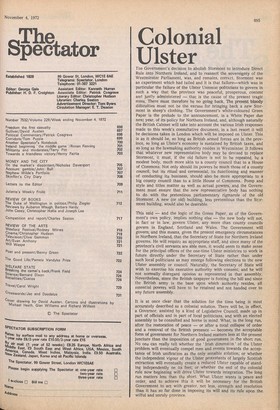Colonial Ulster
The Government's decision to abolish Stormont to introduce Direct Rule into Northern Ireland, and to reassert the sovereignty of the Westminster Parliament, was, and remains, correct. Stormont was an experiment which had failed and it is that failure—which was in particular the failure of the Ulster Unionist politicians to govern in such a way that the province was peaceful, prosperous, content and justly administered — that is the cause of the present tragic mess. There must therefore be no going back. The present bloody difficulties must not be the excuse for bringing back a new Stormont in sheep's clothing. The Government's winite-coloured Green Paper is the prelude to the announcement, in a White Paper due next year, of its policy for Northern Ireland, and, although naturally the British Cabinet will take into account the various Irish responses made to this week's consultative document, in a last resort it will be decisions taken in London which will be imposed on Ulster. This is as it should be, so long as British armed forces are in the province, so long as Ulster's economy is sustained by British taxes, and so long as the lawmaking authority resides in Westminter. It follows that whatever new representative body may be devised to replace Stormont, it must, if the old failure is not to be repeated, be a modest body, much more akin to a county council that to a House of Commons. Not only should its powers be much those of a county council, but its ritual and ceremonial, its functioning and manner of conducting its business, should also be more appropriate to a big county council than to a little House of Commons. Pomp and style and titles matter as well as actual powers, and the Government must ensure that the new representative body has nothing to do with the pretentious parliamentary rigmarole of the old Stormont. A new (or old) building, less pretentious than the Stormont building, would also be desirable.
This said — and the logic of the Green Paper, as of the Government's own policy, implies nothing else — the new body will not, in fact or in law, govern Ulster, any more than county councils govern in England, Scotland and Wales. The Government will govern; and this means, given the present emergency circumstances in Nort'hern Ireland, that the Secretary of State for Northern Ireland governs. He will require an appropriate staff, and since many of the province's civil servants are able men, it would seem to make sense for the principal offices of the one-time Ulster ministries to work in future directly under the Secretary of State rather than under such local politicians as may emerge following elections to the new Ulster assembly or council. Naturally, the Secretary of State will wish to exercise his executive authority with consent; and he will not normally disregard opinion as represented in that assembly. Nevertheless, since the British taxpayer is footing the bill and since the British army is the base upon which authority resides, all essential powers will have to be retained and not handed over to any future assembly.
It is at once clear that the solution for the time being is most accurately destribed as a colonial solution. There will be, in effect, a Governor, assisted by a kind of Legislative Council, made up in part of officials and in part of local politicians, and with an elected assembly to be consulted and borne in mind. What, in the long run, after the restoration of peace — or after a total collapse of order and a removal of the British presence — becomes the acceptable form of government for Northern Ireland matters less at the present juncture than the imposition of good government in ehe short run. No one can really tell whether the 'Irish dimensi3n ' of the Ulster problem will eventually compel men and events towards the acceptance of Irish unification as the only sensible solution; or whether the independent vigour of the Ulster protestants of largely Scottish extraction will eventually create a reduced Ulster capable of standing independently on its feet; or whether the end of the colonial rule now beginning will drive Ulster towards integration. The long run matters less than the short. What Ulster wants is peace and order, and to achieve this it will be necessary for the British Government to act with greater, not less, strength and resolution than it has so far done in imposing its will and its rule upon the wilful and unruly province.








































 Previous page
Previous page